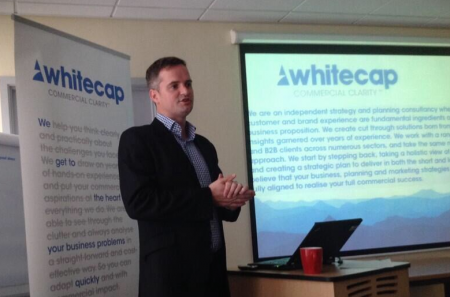A summary of the Whitecap, Barclays & Microsoft event hosted in Leeds on Thursday 19th June 2014:
Last week saw Whitecap join forces with Barclays and Microsoft to deliver a event designed to help attendees ‘Explore the Future’ of business. With additional presentations from Inngot and Ignite Sports, attendees heard from presenters covering strategy, innovation, intellectual property, access to finance, and maximising your personal potential in business.
The event was opened by Helen Clarke of Barclays, who welcomed the audience to the bank’s flagship Leeds branch and set the scene for the presentations that followed.

Strategy
Whitecap’s Julian Wells delivered the opening presentation and laid the foundations for the event by talking about how businesses can define their strategic goals and achieve them, essentially giving them the structure to incorporate the content of the morning’s speakers.
We’ve put Julian’s presentation on Whitecap’s YouTube channel and here is a summary of his key points:
- Strategy shouldn’t be exclusive and inaccessible – it needs to be understood by everyone to be effective. This can then translate into easy everyday decisions, a shared purpose and a sense of inclusiveness – leading to effective strategy implementation
- Having a plan is vital – ‘A strategy can exist without a plan, but a plan cannot exist without a strategy’
- People and culture are more important than ever. The companies that are the best companies to work for, will become the best companies
- Strategy needs to be more dynamic because we all act faster and acquiring knowledge is easier
- Strategy can go wrong. Unrealistic aims and expectations mean you can’t achieve what you have said you want to achieve and can lead to a loss of confidence amongst employees and management alike, and a culture of micro management and excessive reporting
Three things to do to avoid strategy pitfalls:
- Manage your expectations. Think about what you’re asking of your people – ask them to achieve something that’s useful to you
- Tell people the right amount of knowledge. Don’t keep secrets, but don’t overload them with information that isn’t useful to them
- Put a structure in place that allows your managers to make decisions with confidence
Innovation
We then heard from Daniel Langton of Microsoft, who began by outlining the four significant future trends that dominate Microsoft’s thinking:
- Social
- Mobility
- Big Data
- Cloud
Every three years the amount of global data we produce is doubling (largely through social media), which presents amazing opportunities for businesses to know their customers better. To illustrate the point, Microsoft’s Business Intelligence team is growing by 200% a year.
Microsoft believes cloud technology holds the key for managing this data, making it available to people wherever they are (capitalising on mobility) and allowing businesses to make fast decisions by identifying their customers’ next logical purchasing choices.
Establishing the best technology combination for any business is not a straightforward choice, but businesses need to align themselves to emerging trends. Cloud is Microsoft’s fastest growing product – three years ago 26% of customers used it, now 50% of customers do.
Intellectual property
Next was an insightful talk by Dr Alison Orr of Inngot, a firm which works closely with Microsoft and specialises in understanding and exploiting IP in businesses. Audience members were enlighted as to what constitutes IP in a business. Brand, designs, software and websites all attract IP protection, while databases, software code and even test results are all valuable and should be factored into formal valuations.
According to Inngot, just 22% of medium companies, 13% of small enterprises and 2% of micro firms own any registered rights. Over 70% of organisations don’t know they have at least five things that can be registered as IP. The takeaway message was ‘if you don’t know what you’ve got, you can’t protect or exploit it’.
Funding for growth
The next topic was the all important one of funding. Banks have had a particularly bad press over recent years and it was refreshing to hear a really positive presentation from Andrew Parmenter of Barclays’ business banking team. He outlined the types of lending Barclays undertakes to businesses, and the criteria Barclays look for when accepting a business loan application. He uses the CAMPARI model, which business owners can use as a template when presenting applications:
- Character, Ability, Margin, Purpose, Amount, Repayment, Insurance
The overall message was that criteria was loosening and authority for approving loans was being passed back to the regional teams and those that really know their business customers, rather than the central credit teams. To illustrate the point, businesses in Yorkshire looking for loans of less than £3m can now apply directly to Andrew for a decision.
Performance
To end on a really positive note, Duncan McCarthy of Ignite Sports, who helps sportsmen and businesses achieve their potential by paying attention to small changes, spoke about setting and achieving goals that challenge but ultimately reward. You can see some of Duncan’s presentation here.
He spoke about practicing with intensity and the value of leaving your comfort zone. He works with athletes, focusing on their weaknesses and helping them prepare mentally as well as physically for competition. It must be working too, with Duncan’s clients racking up over 80 golf tournament wins in the last three years. The underlying message of Duncan’s presentation was about doing your very best, day in day out, and staying in the present.
This was a fitting way to close the day, as it brought together all the other topics. Whilst it’s undoubtedly true that you need to analyse the past, plan for the future, and ensure you protect and build value in your business, the simple fact is that if you don’t do the best job you can on what lies in front of you in any particular day, then you won’t reach the highest level of performance that you are capable of.